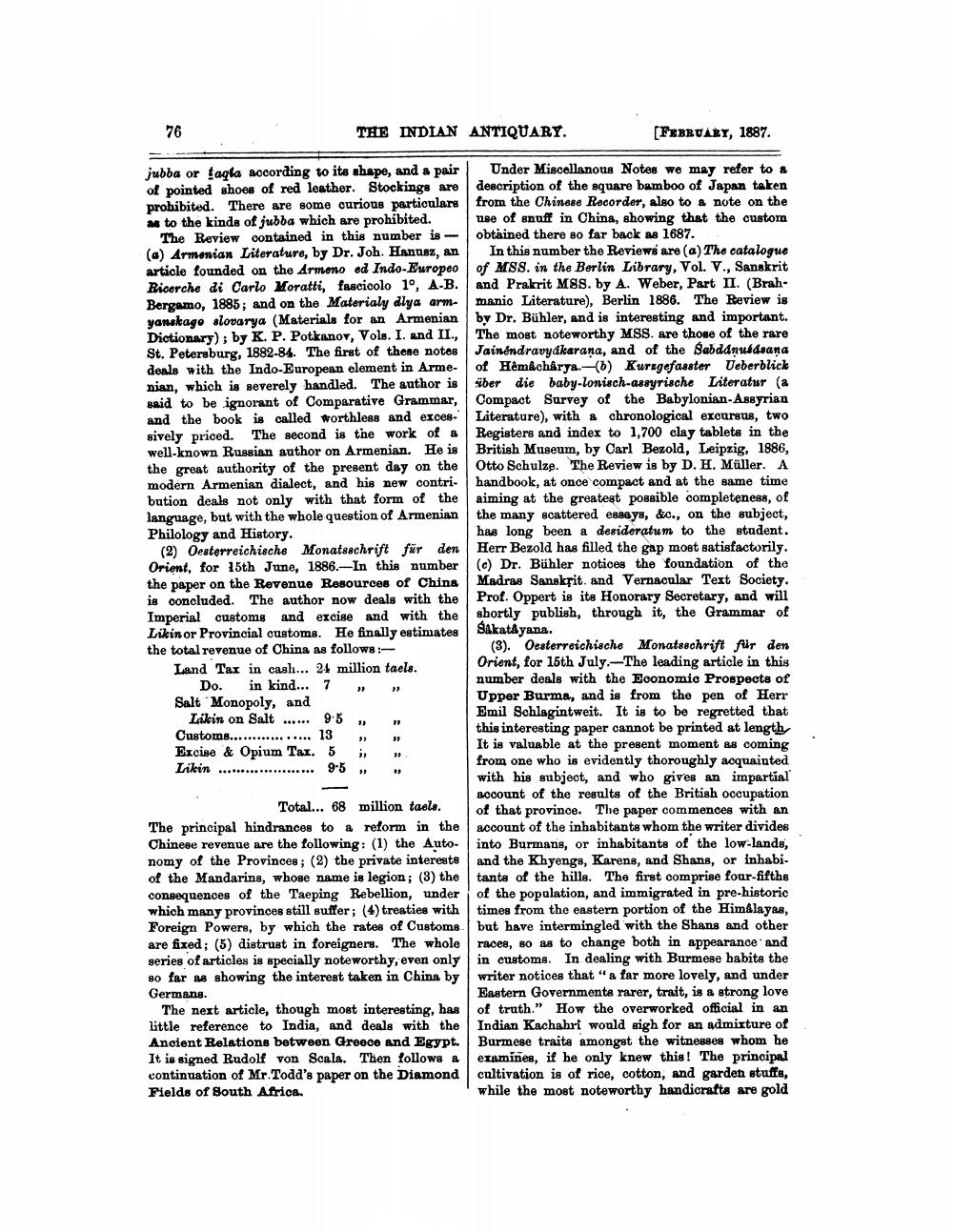________________
76
THE INDIAN ANTIQUARY.
(FEBRUARY, 1887.
jubba or taqla according to its shape, and a pair of pointed shoes of red leather. Stockings are prohibited. There are some curious particulars w to the kinds of jubba which are prohibited.
The Review contained in this number is - (a) Armenian Literature, by Dr. Joh. Hantaz, an article founded on the Armeno od Indo-Europeo Ricerche di Carlo Moratti, fascicolo 1o, A-B. Bergamo, 1885; and on the Materialy dlya armyanskago slovarya (Materials for an Armenian Dictionary); by K. P. Potkanov, Vols. I and II., St. Petersburg, 1882-84. The first of these notes deals with the Indo-European element in Armenian, which is severely handled. The author is said to be ignorant of Comparative Grammar, and the book is called worthless and exces. sively priced. The second is the work of a well-known Russian author on Armenian. He is the great authority of the present day on the modern Armenian dialect, and his new contri. bution deals not only with that form of the language, but with the whole question of Armenian Philology and History.
(2) Oesterreichische Monatsschrift für den Oriont, for 15th June, 1886.-In this number the paper on the Revenue Resources of China is concluded. The author now deals with the Imperial customs and excise and with the Likinor Provincial customs. He finally estimates the total revenue of China as follows:Land Tax in cash... 24 million taels.
Do. in kind... 7 » Salt Monopoly, and
Likin on Salt ...... 9.5 » Customs................. 13 Excise & Opium Tax. 5 Likin ....................... 9-5 »
Under Miscellanous Notes we may refer to a description of the square bamboo of Japan taken from the Chinese Recorder, also to a note on the use of snuff in China, showing that the custom obtained there so far back as 1687.
In this number the Reviews are (a) The catalogue of MSS. in the Berlin Library, Vol. V., Sanskrit and Prakrit MSS. by A. Weber, Part II. (Brahmanic Literature), Berlin 1886. The Review is by Dr. Bühler, and is interesting and important. The most noteworthy MSS. are those of the rare Jainendravyákarana, and of the Sabdanuldsana of Hêmâchêrya.-() Kurzgefasster Ueberblick über die baby-lonisch-assyrische Literatur (a Compact Survey of the Babylonian-Assyrian Literature), with a chronological excursus, two Registers and index to 1,700 clay tablets in the British Museum, by Carl Bezold, Leipzig, 1986, Otto Schulze. The Review is by D. H. Müller. A handbook, at once compact and at the same time aiming at the greatest possible completeness, of the many scattered essays, &c., on the subject, has long been a desideratum to the student. Herr Bezold has filled the gap most satisfactorily. (c) Dr. Bühler notices the foundation of the Madras Sanskrit and Vernacular Text Society. Prof. Oppert is its Honorary Secretary, and will shortly publish, through it, the Grammar of Sakatåyana.
(3). Oesterreichische Monatsschrift fir den Orient, for 15th July.-The leading article in this number deals with the Economio Prospects of Upper Burma, and is from the pen of Herr Emil Schlagintweit. It is to be regretted that this interesting paper cannot be printed at length It is valuable at the present moment as coming from one who is evidently thoroughly acquainted with his subject, and who gives an impartial socount of the results of the British occupation of that province. The paper commences with an account of the inhabitants whom the writer divides into Burmans, or inhabitants of the low-lands, and the Khyengs, Karens, and Shans, or inhabitants of the hills. The first comprise four-fifths of the population, and immigrated in pre-historic times from the eastern portion of the Himalayas, but have intermingled with the Shans and other races, so as to change both in appearance' and in customs. In dealing with Burmese habits the writer notices that "a far more lovely, and under Eastern Governments rarer, trait, is a strong love of truth." How the overworked official in an Indian Kachahri would sigh for an admixture of Burmese traita amongst the witnesses whom he examines, if he only knew this! The principal cultivation is of rice, cotton, and garden stuffs, while the most noteworthy handicrafts are gold
Total... 68 million taels. The principal hindrances to a reform in the Chinese revenue are the following: (1) the Autonomy of the Provinces; (2) the private interests of the Mandarins, whose name is legion; (3) the consequences of the Taeping Rebellion, under which many provinces still suffer; (4) treaties with Foreign Powers, by which the rates of Customs are fixed; (5) distrust in foreigners. The whole series of articles is specially noteworthy, even only so far as showing the interest taken in China by Germans.
The next article, though most interesting, has little reference to India, and deals with the Ancient Relations between Green6 and Egypt. It is signed Rudolf von Scala. Then follows a continuation of Mr.Todd's paper on the Diamond Fields of South Africa.




